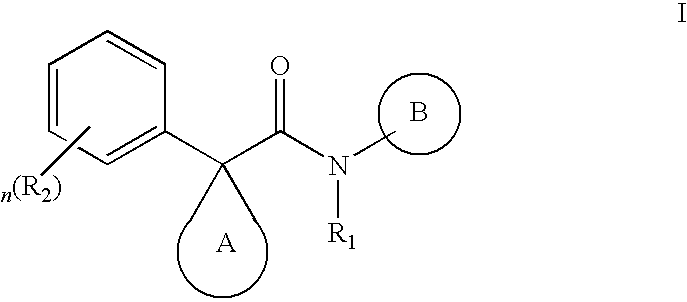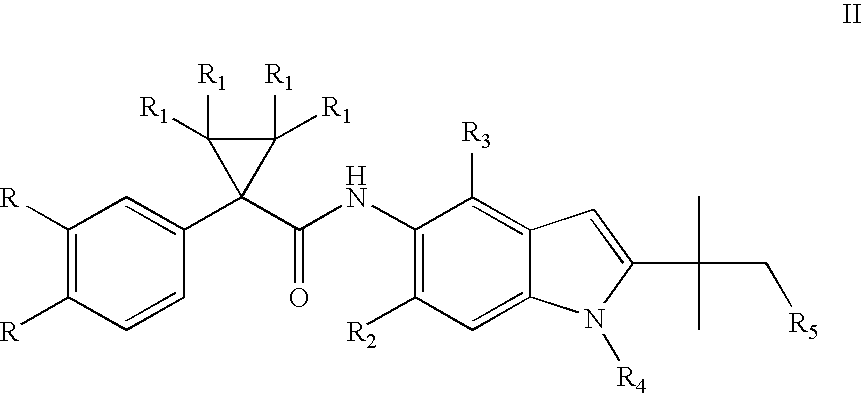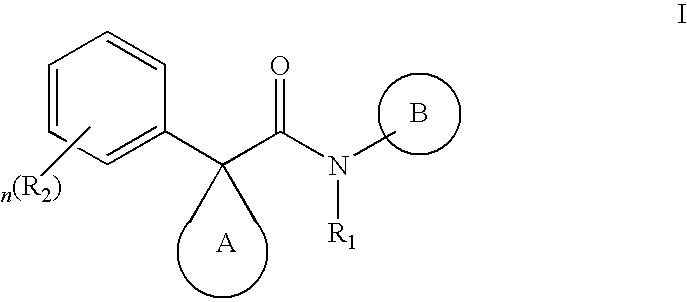Indole derivatives as CFTR modulators
a technology of indole derivatives and modulators, which is applied in the field of modulators of atpbinding cassette (“ abc”) transporters, can solve the problems of imbalance in ion and fluid transport, debilitating and fatal effects of cf, and reducing anion transport, so as to reduce the severity
- Summary
- Abstract
- Description
- Claims
- Application Information
AI Technical Summary
Benefits of technology
Problems solved by technology
Method used
Image
Examples
example 1
1-Benzo[1,3]dioxol-5-yl-cyclopropanecarboxylic acid
[0400]
[0401]A mixture of 2-(benzo[d][1,3]dioxol-5-yl)acetonitrile (5.10 g 31.7 mmol), 1-bromo-2-chloro-ethane (9.00 mL 109 mmol), and benzyltriethylammonium chloride (0.181 g, 0.795 mmol) was heated at 70° C. and then 50% (wt. / wt.) aqueous sodium hydroxide (26 mL) was slowly added to the mixture. The reaction was stirred at 70° C. for 24 hours and then heated at 130° C. for 48 hours. The dark brown reaction mixture was diluted with water (400 mL) and extracted once with an equal volume of ethyl acetate and once with an equal volume of dichloromethane. The basic aqueous solution was acidified with concentrated hydrochloric acid to pH less than one and the precipitate filtered and washed with 1 M hydrochloric acid. The solid material was dissolved in dichloromethane (400 mL) and extracted twice with equal volumes of 1 M hydrochloric acid and once with a saturated aqueous solution of sodium chloride. The organic solution was dried over...
example 2
1-(2,2-Difluoro-benzo[1,3]dioxol-5-yl)-cyclopropanecarboxylic acid
[0408]
2,2-Difluoro-benzo[1,3]dioxole-5-carboxylic acid methyl ester
[0409]A solution of 5-bromo-2,2-difluoro-benzo[1,3]dioxole (11.8 g, 50.0 mmol) and tetrakis(triphenylphosphine)palladium (0) [Pd(PPh3)4, 5.78 g, 5.00 mmol] in methanol (20 mL) containing acetonitrile (30 mL) and triethylamine (10 mL) was stirred under a carbon monoxide atmosphere (55 PSI) at 75° C. (oil bath temperature) for 15 hours. The cooled reaction mixture was filtered and the filtrate was evaporated to dryness. The residue was purified by silica gel column chromatography to give crude 2,2-difluoro-benzo[1,3]dioxole-5-carboxylic acid methyl ester (11.5 g), which was used directly in the next step.
[0410]
(2,2-Difluoro-benzo[1,3]dioxol-5-yl)-methanol
[0411]Crude 2,2-difluoro-benzo[1,3]dioxole-5-carboxylic acid methyl ester (11.5 g) dissolved in 20 mL of anhydrous tetrahydrofuran (THF) was slowly added to a suspension of lithium aluminum hydride (4.10...
example 3
2-(2,2-Dimethylbenzo[d][1,3]dioxol-5-yl)acetonitrile
[0421]
(3,4-Dihydroxy-phenyl)-acetonitrile
[0422]To a solution of benzo[1,3]dioxol-5-yl-acetonitrile (0.50 g, 3.1 mmol) in CH2Cl2 (15 mL) was added dropwise BBr3 (0.78 g, 3.1 mmol) at −78° C. under N2. The mixture was slowly warmed to room temperature and stirred overnight. H2O (10 mL) was added to quench the reaction and the CH2Cl2 layer was separated. The aqueous phase was extracted with CH2Cl2 (2×7 mL). The combined organics were washed with brine, dried over Na2SO4 and purified by column chromatography on silica gel (petroleum ether / ethyl acetate 5:1) to give (3,4-dihydroxy-phenyl)-acetonitrile (0.25 g, 54%) as a white solid. 1H NMR (DMSO-d6, 400 MHz) δ 9.07 (s, 1H), 8.95 (s, 1H), 6.68-6.70 (m, 2H), 6.55 (dd, J=8.0, 2.0 Hz, 1H), 3.32 (s, 2H).
[0423]
2-(2,2-Dimethylbenzo[d][1,3]dioxol-5-yl)acetonitrile
[0424]To a solution of (3,4-dihydroxy-phenyl)-acetonitrile (0.20 g, 1.3 mmol) in toluene (4 mL) was added 2,2-dimethoxy-propane (0.28...
PUM
 Login to View More
Login to View More Abstract
Description
Claims
Application Information
 Login to View More
Login to View More - R&D
- Intellectual Property
- Life Sciences
- Materials
- Tech Scout
- Unparalleled Data Quality
- Higher Quality Content
- 60% Fewer Hallucinations
Browse by: Latest US Patents, China's latest patents, Technical Efficacy Thesaurus, Application Domain, Technology Topic, Popular Technical Reports.
© 2025 PatSnap. All rights reserved.Legal|Privacy policy|Modern Slavery Act Transparency Statement|Sitemap|About US| Contact US: help@patsnap.com



